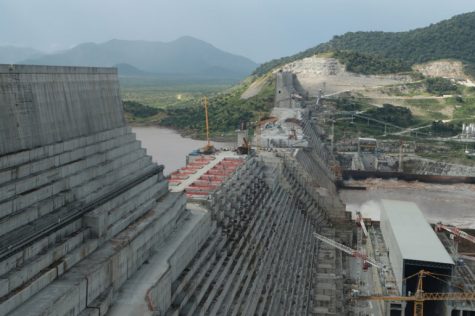Construction of Nile dam provides hope for Ethiopia and dread for Egypt
May 28, 2021

The decade-long dispute over who controls Africa’s longest river has escalated, as Ethiopia, Egypt and Sudan, have repeatedly failed to reach an agreement over the construction of the Grand Ethiopian Renaissance Dam (GERD). The dam will bring a stable source of electricity to Ethiopia but puts Egypt’s water supply in a perilous position.
The GERD would not be the first dam built on the Nile. Before the construction of the Aswan High Dam, the Nile River annually flooded fields, depositing millions of tons of nutrient-filled silt which spurred agricultural prosperity and was a major factor in the grandeur of Ancient Egypt. However, the cycle of flood and unpredictable drought was unsustainable. The charismatic President Gamal Abdel-Nasser directed the construction of the Aswan High Dam which was completed in the early 1970’s with the financial backing from the Soviet Union. Not only did the dam, just 500 miles south of Cairo, spare Egyptians from the floods and drought, it generated hydroelectric power propelling Egypt’s rapid growth.
Despite the many benefits, there are consequences to the Aswan Dam. One major social and economic effect is the decrease in fertility of the agricultural lands in the Nile delta. This was mainly caused by the lack of silt deposits which act as a fertilizer. Today, Egypt wields the Nile as a source of drinking water, household uses, fishing and agriculture.
Unbeknownst to Egypt, the construction of the GERD began in 2011 when the nation was preoccupied by the “Arab Spring.” The dam now holds back approximately 4.9 billion cubic meters of the Blue Nile water. The Blue Nile, the main source of water, converges with the White Nile, marked by light-colored clay sediment, in Sudan.
The hydroelectric power generated by the dam would supply millions of Ethiopians with a stable source of electricity, lift millions out of poverty and boost economic development.
“For Ethiopia, accessing and utilising its water resources is not a matter of choice, but of existential necessity,” Taye Atske-Selassie, Ethiopia’s UN ambassador, said.
The dam has been the subject of fervent nationalism; flag waving parades, proclamations by the Ethiopian Orthodox Patriarch, and new pop songs centered around the dam. For others, the dam is a symbol for hope.
“Mothers who’ve given birth in the dark, girls who fetch wood for fire instead of going to school — we’ve waited so many years for this — centuries,” Filsan Abdi, Ethiopia’s minister for women and children, said. “When we say that Ethiopia will be a beacon of prosperity, well, it starts here.”
On the other hand, the threat of water scarcity for Egypt poses serious problems. The dam would severely restrict the amount of sacred water flow going into the country. Even without the dam, the delta’s irrigation canals have dried up due to climate change, poor maintenance and mismanagement. It would also have severe consequences on Sudan, which lies on the Blue Nile as well.
“The World Bank classifies water scarcity as when there is less than 1,000 cubic meters of fresh water per person a year,” the BBC reports. “In Egypt, the figure is 550 cubic meter per person annually, according to the government.”
Egypt and Sudan have repeatedly tried to negotiate with Ethiopia with no avail. Egypt demands that the dam should be filled up slowly, eliminating the drought that is anticipated to ensue. Ethiopia refuses, as the country wants to generate electricity as soon as possible and make up the costs for the construction. It seems as if Egypt is losing the battle as there’s already an exuberant amount of water in the dam due to the rainy season.
Delegations of the three countries met recently in Kinshasa, Democratic Republic of Congo, but failed to bridge differences or come to an agreement. After the unsuccessful meeting, Egyptian President Abdel Fattah al-Sisi warned of the risk of conflict.
“I am telling our brothers in Ethiopia, let’s not reach the point where you touch a drop of Egypt’s water, because all options are open,” Sisi said.
Egypt and Sudan had proposed including other mediators such as the European Union, the United States and the United Nations to the talks. Both countries said Ethiopia rejected the proposal during the meeting.
“There is no need to enter an unnecessary war,” Sisi said. “A war can’t start because of water. Water flows if you fight today, it’ll continue to flow tomorrow.”


